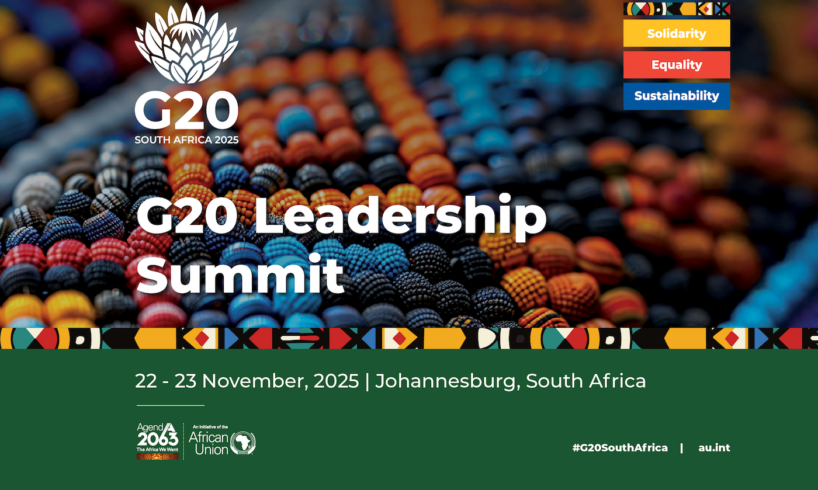
India stands at a pivotal juncture as the world prepares for the G20 Summit in Johannesburg in November 2025. The global economic environment is fragile: growth has slowed to about 2.4% in 2025 from 2.9% in 2024 amid trade tensions, tariff hikes and weaker investment. Inflation remains sticky, and progress toward the Sustainable Development Goals has faltered. In this context, the G20—representing roughly 85% of global GDP and 75% of international trade—must act decisively. As the world’s fourth-largest economy by nominal GDP and third by purchasing power parity, India can help steer the summit’s priorities toward realistic, inclusive solutions.
India’s economy has shown resilience. GDP growth for FY2024/25 is estimated at about 6.5%—down from the previous year’s surge but still among the strongest in major economies—and the April–June 2025 quarter expanded by an estimated 7.8% year on year. Strong domestic demand, rising services exports, digital innovation and sustained infrastructure investment underpin this momentum. With inflation broadly contained and a young labour force averaging 28 years of age, India continues to attract long-term capital and foreign investment. This growth base gives India credibility to speak for developing economies seeking stability and opportunity; as a large emerging market with both industrial and agricultural heft, it can bridge the needs of advanced and transitional economies.
South Africa’s presidency has placed inclusion, fairness and sustainability at the centre of the G20 agenda, aligning with the priorities of the Global South. This theme resonates with India’s development philosophy of “Vasudhaiva Kutumbakam”—the world as one family. India can operationalise these principles through three broad interventions: promote equitable growth, drive green and digital transitions, and support reform of global governance.
The first challenge in Johannesburg will be reviving growth and jobs. With global output expected to hover near 2.5% in 2025—insufficient for development ambitions—India can table a pragmatic agenda centred on small and medium-sized enterprises, digital trade and skills. Building on its 2023 G20 blueprint, India could push a global SME framework to expand access to finance, digital training and cross-border e-commerce. Domestic experience offers proof points: Startup India, the Unified Payments Interface and the Jan Dhan–Aadhaar–Mobile stack show how digital infrastructure can democratise opportunity. With hundreds of millions using digital payments monthly, India presents a replicable model for human-centric technology design, a priority for the G20’s digital inclusion track.
Climate transitions will dominate the summit. Following Indonesia (2022), India (2023) and Brazil (2024), the 2025 agenda will again centre on climate finance and implementation. India’s LiFE (Lifestyle for Environment) movement—promoting sustainable living—could be scaled into a collaborative framework that pairs South–South technology exchange with renewable-energy financing and biodiversity partnerships. While the world has drifted from the principle of “common but differentiated responsibilities,” India can argue for practical standards that combine fairness with measurable goals for energy-transition funding. Its leadership in the International Solar Alliance and the pledge to source half of electricity from non-fossil capacity by 2030 enhance its credibility.
Food security will be another priority. The nexus between climate risk, agricultural productivity and global supply chains demands systemic reform. As the world’s second-largest food producer, India can champion climate-resilient agriculture—efficient irrigation, resilient seeds and technology-enabled crop monitoring—while advocating diversified energy partnerships to ease the burden of volatile oil and grain prices. India’s work on green hydrogen and critical-minerals supply chains could seed G20 projects linking African resource economies with Asian manufacturing centres.
The summit also unfolds amid a “polycrisis”: overlapping shocks in geopolitics, finance and sustainability. Many developing countries face heavier debt service, higher borrowing costs and tighter fiscal space. India can propose a revitalised Debt Service Suspension Initiative with broader eligibility, including some middle-income economies. With sizeable foreign-exchange reserves and relatively stable external indicators, India brings credibility to discussions on financial stability.
Reform of multilateral institutions remains overdue. Voting power and governance at the IMF and World Bank still skew toward advanced economies, while the BRICS-led New Development Bank signals demand for more equitable finance. India can leverage its positions in both the G20 and BRICS to argue for more representative, performance-driven decision-making—and for practical cooperation rather than rivalry between existing and new lenders.
Artificial intelligence is likely to feature prominently under South Africa’s presidency. India’s digital public infrastructure provides a practical template for AI-enabled public services with built-in safeguards. Case studies in education, agriculture and health show how AI can expand inclusion rather than deepen divides. An India-led coalition of universities, research institutes and policy think tanks across regions could translate G20 principles on AI ethics, safety and data governance into actionable pilots.
Finally, geopolitics will test consensus. The aftershocks of the Ukraine war and US–China tensions have paralysed several global fora. India’s strategic autonomy and multi-alignment—engaging both Western partners and the BRICS+ group—position it to mediate between competing blocs and promote cooperative outcomes. Its diplomatic tradition, from the Non-Aligned Movement to present-day convening power, strengthens its hand.
In Johannesburg, India’s influence will rest not just on economic scale but on the credibility of its ideas. A focus on fair growth, environmental stewardship and digital access aligns with South Africa’s theme of “solidarity, equality, sustainability.” With global growth slowing and inequality widening, India’s blend of technological capability and social inclusion can help the G20 move from communiqués to practical cooperation.




